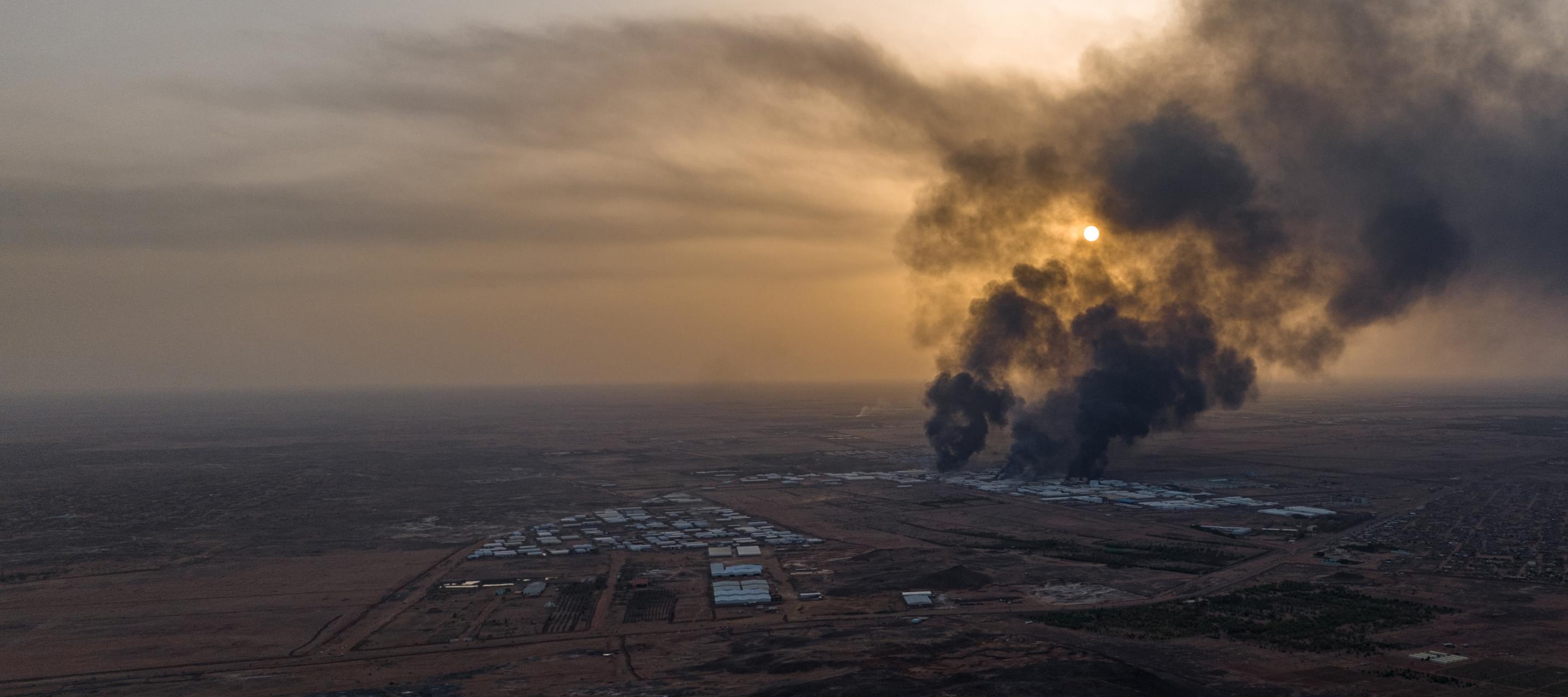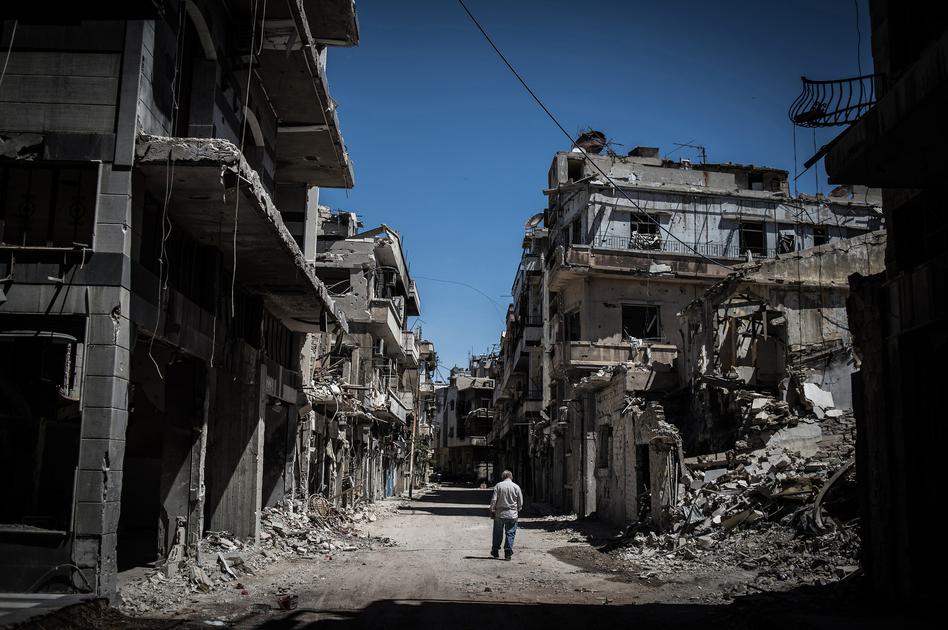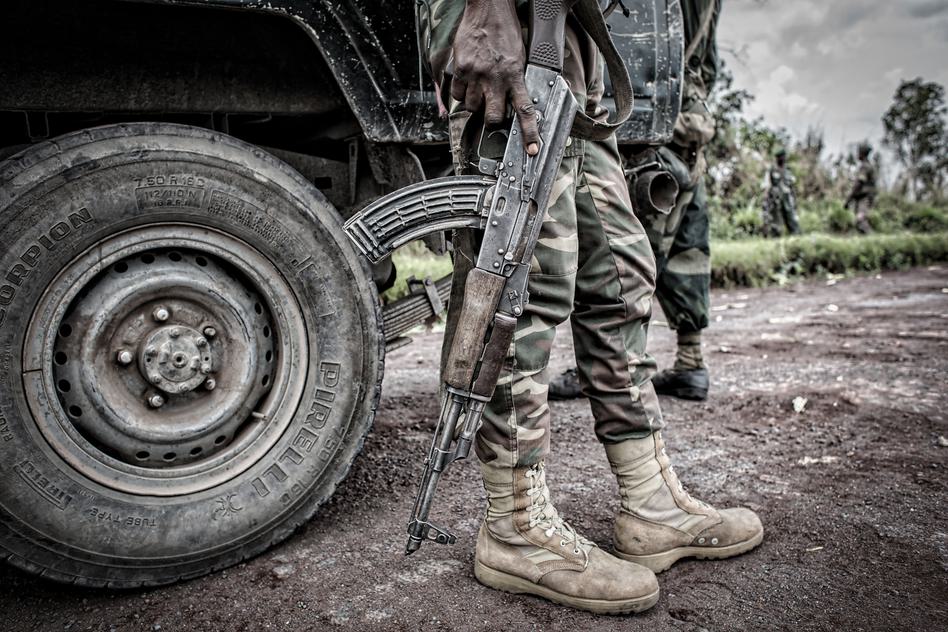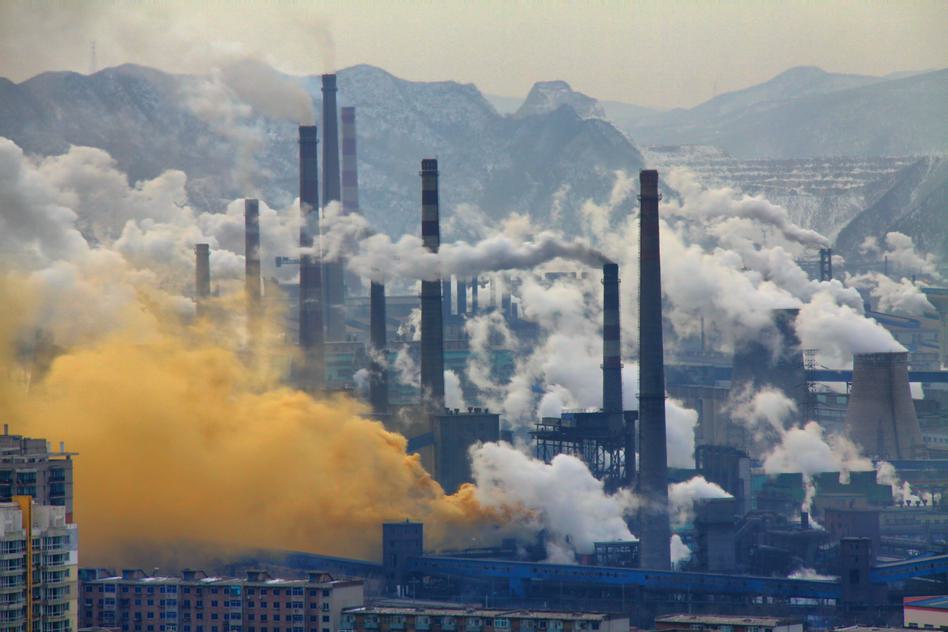Top Ten Business and Human Rights Issues in 2025
9 December 2024 | 18 minute read

For decades, global markets and institutions have steered the international order. Until now.
Today’s world faces greater conflict, fragmentation, and uncertainty. Despite new efforts such as the United Nations Pact for the Future, which aims to reset global cooperation and reaffirm shared commitments, the past year was marked by violent confrontations, mounting political challenges, and anti-establishment election results in many countries.
In these divisive and uncertain times, how can responsible business action be strengthened?
Amidst growing complexity and divisions, influential actors can alleviate - or exacerbate - harms to people and planet. In 2025, leaders can commit to meeting the moment by advocating for the vital importance of global cooperation and respect for rule of law. They can redouble efforts to apply existing human rights frameworks and tools more effectively, including in unpredictable and difficult operating environments. Despite the many challenges companies face, they can work proactively with other societal actors to help guide better pathways forward.
Each International Human Rights Day, IHRB releases our Top 10 Business & Human Rights Issues - an annual forecast of priority challenges and opportunities to advance responsible business practices in the year ahead.
Our 2025 Top 10 list explores some of the most important issues bound by uncertainty - whether due to breakdown in multilateralism, the spread of violent conflict, industry-changing legislation, or climate action inertia. We hope this year’s issues will help guide businesses at a time when the picture of our future is far from clear.

Ensuring accountability in the rush for renewables
The transition to more sustainable energy systems is urgently needed. Will companies in renewables industries be accountable for their impacts on land, water and communities?
Renewable energy consumption is forecast to grow by 60% between now and 2030. This growth brings greater demand for transition minerals, as well as land to build clean energy infrastructure. The so-called ‘green rush’ is well underway.
Onshore wind and solar farms require vast land areas. Forced displacement of communities is occurring already. Indigenous livelihoods, such as artisanal fishing or animal herding have been disrupted by new renewables projects. Building green hydrogen facilities at ports or transmission infrastructure for offshore wind farms involves destruction of mangroves, critical habitats for flood and sea level rise protection, and is impacting fish stocks for marginalised communities' food security and livelihoods, as anticipated in La Guajira, Colombia.
Meanwhile, demand for transition minerals used in renewables technology, such as cobalt and lithium, is expected to triple by 2030. There is a danger of continuing environmental and social harms and exploitation carried out over decades in the extractive sector, from the oil fields of the Niger Delta to Congolese cobalt mines. In these and other places, fragile ecosystems have been devastated, and rights of local communities to livelihood, food security, clean water, and a healthy environment have been repeatedly abused.
Companies working in renewable energy industries now need to develop their own robust environmental and human rights impact assessments in line with the UN Guiding Principles, and the EU Corporate Sustainability Due Diligence Directive and associated reporting requirements. They must recognise Free, Prior, Informed Consent processes with indigenous communities, and the importance of ongoing dialogue with community representatives as well as local governments, and scale up transparent reporting, effective grievance mechanisms and access to remedies. All are key elements of meaningfully engaging with people most impacted, and remaining accountable to them throughout the entire lifecycle of a company's operations. Not to do so risks further conflict and delay, and will lead to significant costs in the long run.
In 2025 renewables are set to overtake coal as the world’s largest source of electricity. The transition to a low-carbon economy cannot be based solely on extraction of value. There is an unprecedented opportunity now for renewable energy companies and other actors involved in mineral extraction to move rapidly towards regenerative models based on partnership, shared long-term benefit for communities, and ecosystem protection or restoration.
Image: Erberto Zani / Adobe Stock

Preventing finance from fueling conflict
Finance is crucial in tackling the climate crisis and fostering sustainable development. But is the financial sector doing enough to address adverse impacts of investments and implement responsible business standards?
Corruption and illicit financial flows are major enablers of conflict. A 2024 UN Office on Drugs and Crime report highlights how corruption in climate change financing can divert resources meant to promote sustainable development and security, ultimately exacerbating instability. Many financial sector actors still don’t have in-depth knowledge of how their decisions may cause or contribute to human rights harms. This is compounded by the backlash to ESG investment models and policies. Adding to these problems is the current lack of acceptable data and metrics so that all companies share clear benchmarks for best practices on social performance.
The rise of cryptocurrencies has added complexity to these issues. While proponents of cryptocurrencies claim they offer financial inclusion, this is questionable. Cryptocurrencies are also becoming a significant tool in facilitating illicit activities, evading sanctions and funding violence.
Financial integrity and responsible investment have emerged as key factors in mitigating the risks of global financial actors unwittingly or deliberately contributing to violence and instability. The UN Principles for Responsible Investment (PRI) provide guidance for investors to assess human rights risks and avoid investments that may contribute to conflicts or support oppressive regimes. Meanwhile, newer financial actors such as the Asian Infrastructure Investment Bank are being called on to take their own responsibilities seriously. That includes prioritising meaningful engagement with affected communities, disclosing relevant information on project impacts around the world, and putting in place effective grievance mechanisms, all in order to prevent or mitigate harms linked to their financing.
As the global community prepares for the 2025 Financing for Development Conference (FfD4), as well as the expected update of the IFC’s Sustainability Framework and Performance Standards, there are growing calls for stronger international regulations to ensure financial markets contribute to peace, stability, and human dignity—rather than fueling conflict and war. Financial actors will continue to be scrutinised for the impacts of their activities on the rights of individuals and communities. Implementing guidance such as the UN Finance Initiative’s new Responsible Banking Blueprint - a roadmap for action on climate, nature and biodiversity, healthy and inclusive economies and human rights, can help demonstrate how effective due diligence processes lead to investments and transactions that foster stability, including in regions experiencing environmental emergencies, violence and political divisions.
Image: Abd Almohimen Sayed / iStock

Confronting AI Risks
New international commitments to digital cooperation and regulation of AI are important steps in response to fast moving technological change. Are they enough to ensure responsible business actions?
Rapid advances in Artificial Intelligence (AI) have raised serious questions about the promise and perils of this technology. Concerns have prompted a growing number of initiatives by governments, companies, advocacy groups, think tanks, humanitarian organisations, and the Office of the High Commissioner for Human Rights all intended to address how AI tools can be developed and used responsibly. .Companies at the forefront of developing AI technology are attempting to assure regulators and governments of their commitments to ‘responsible’ AI, which will weed out misinformation and disinformation and related societal harms. But the potential for bad actors to misuse the technology has alarmed regulators.
The risks of AI to human rights are manifold; including potential bias leading to discriminatory practices; risks to privacy; machine-led decision-making raising questions of accountability; censorship of legitimate speech; and AI-generated content spreading misinformation and disinformation, which could lead to social unrest and contribute to violence.
In September 2024, government leaders at the United Nations adopted a new Global Digital Compact calling for scaled up actions to close digital divides, build an open, inclusive, and secure digital space, and make AI work for humanity. The test for the year ahead is to turn these high level commitments into tangible activities that embed human rights protections and benefit all people.
To implement a principles-based, rights-respecting AI framework, businesses will have to scale up investments in human oversight, and reskilling (or skilling up) engineers. Governments must prioritise developing clearer guidelines, and instead of relying on industry-led, voluntary approaches, set firmer legally-binding rules. The European Union’s AI Act prohibits manipulative AI and social scoring systems that are considered unacceptable risks. It also sets a regulatory framework for high-risk systems, and calls on companies to be transparent with users if they are communicating with AI chatbots.
In the year ahead, companies will face growing calls to advance responsible global AI standards - whether they are AI creators, or AI users. In the short term, priority actions are required, such as securing permission from users and all those whose rights are affected about how AI uses their data, how long it will be stored, and who it will be shared with, among other disclosures. Continuous monitoring will become essential, and governments will need to put in place effective penalties for misuse or non-compliance, as well as regular audits, and redress mechanisms.
Image: Jason O’Rear Photography / Gensler

Responding to shipping dangers
Deceptive shipping practices such as dark fleets, as well as ongoing conflicts, are undermining responsible maritime activity and putting seafarers’ lives at risk. What actions are needed to protect rights at sea?
So-called ‘shadow fleets’ or ‘dark fleets’ are not a new development in shipping, but have become the subject of increasing attention, largely as a result of sanctions imposed by the EU, US and G7 against Iranian, Venezuelan, and, more recently, Russian oil.
A large and dangerous fleet of poorly regulated tankers is illegally transporting sanctioned oil and gas across the world’s seas. These vessels are often old, unsafe, and flagged in countries with little or no infrastructure to police or monitor them. Ownership is largely opaque. They carry out high-risk activities such as offshore ship-to-ship transfer of cargo without adhering to basic safety standards. Additionally, they frequently switch off Automatic Identification Systems to prevent being seen or tracked – a danger in itself. Companies that ‘insure’ such vessels are unlikely to pay out in the event of an accident or spill, and such vessels often are non-compliant with Oil Companies International Marine Forum (OCIMF) standards or the Maritime Labour Convention.
Dark fleets present huge risk for the seafarers and the potential for environmental catastrophe. The Atlantic Council has stated that “the shadow fleet poses mounting risks to other vessels, to coastal countries, and to countries in whose search and rescue areas of responsibility the vessels may have incidents.” There is evidence seafarers often are not aware these vessels are illegal when they board. They face risks of exploitation and minimal safety standards. And there is a much increased risk of abandonment of these vessels (reported abandonments have tripled since 2021). Areas particularly at risk are those with busy shipping lanes, but an accident with a dark fleet vessel could happen anywhere.
In response, governments have taken steps such as detaining more tankers for failing safety inspections, and strengthening patrols. But the legal position for states is complex and itself fraught with risk, not least potential retaliation from states facing sanctions. Some have suggested regulation on ship acquisitions. In a recent call to action signed by dozens of countries, the UK Government urged “ship owners and operators, the marine insurance industry, ship brokers and other relevant maritime stakeholders to adhere to their relevant obligations, and support the prevention, detection and reporting of ‘shadow fleet’ activities.”
In 2025, industry leaders must scale up efforts to work with governments, such as the UK’s new Office of Trade Sanctions Implementation (OTSI), to expose bad practice. Companies, including law firms and finance institutions,ports and insurers, have a responsibility to carry out stringent due diligence to ensure their activities and transactions are not facilitating dark fleet activities.
Image: ITF Seafarers’ Photo Competition

Rebuilding war-torn states
In the wake of destructive conflict, countries need rebuilding, but too often responsible business is missing in action. What are the opportunities to strengthen human rights as part of reconstruction efforts?
With more active conflicts today than at any time since World War II, rebuilding societies ravaged by war is an ongoing priority. In regions recovering from conflict, reconstruction projects often face considerable hurdles: political instability, fragile infrastructure, and damaged ecosystems, all against a backdrop of potential corruption, marginalisation, and tension.
Past reconstruction efforts highlight risks of neglecting human rights and community engagement. In these post-conflict contexts, rapid development - such as rebuilding roads, energy and communications infrastructure - can inadvertently fuel existing disparities, harm natural environments, or exclude marginalised groups, undermining long-term recovery, and exacerbating conditions that lead to repeated cycles of conflict.
Businesses are critical to reconstruction, in part by mobilising resources and expertise to re-shape infrastructure and buildings. Responsible companies can foster stability, equity, and sustainability in communities working to achieve lasting peace. But private sector involvement may bring additional uncertainty and instability, making rebuilding more challenging for those involved.
The private sector must navigate the urgency to rebuild as well as the necessity to engage with local communities and ecosystems. They may face difficult tradeoffs between relying on expertise from abroad or rebuilding local capacity on the ground. Without adequate safeguards, businesses may become involved in resource mismanagement, and human rights abuses, and may face reputational damage, legal challenges, and financial losses.
Proactively promoting transparency and equitable development is essential in post-conflict settings where governance is fragile. Most reconstruction efforts will be based on contractual arrangements where heightened human rights due diligence should be required at all levels. This might entail prioritising sustainable practices in areas such as transport, housing, water, and energy as crucial first steps. These resources are essential enablers of long term reconstruction and lasting peace. Anti-corruption due diligence and community consultation are also essential.
Companies should consider the added challenge of the climate crisis, particularly where the natural environment has been severely damaged by warfare, such as the recent accusations of ecocide by Russia in Ukraine. A new Environmental Compact for Ukraine proposes measures to enable reconstruction for a sustainable future based on accountability and recovery from the ongoing conflict.
Meanwhile, governments must create an enabling environment for responsible business through necessary legal and regulatory reform, tax incentives and political risk insurance. New initiatives, including the recently adopted model law on public-private partnerships and concessions, developed by the European Bank for Reconstruction and Development and the UN Economic Commission for Europe are noteworthy. Governments need guidance in designing legal frameworks for such arrangements in ways that will help advance sustainable development.
Image: Chaoyue Pan / Flickr

Abiding by humanitarian law
Many businesses operate in high risk and conflict zones. What more can be done to apply international law to those linked to harms and incentivise responsible actions amidst violence and other forms of unrest?
The number of violent conflicts has risen globally. Current reports note that 210 million people live in territories that are either under the full control of non-state armed actors or in contested territory.
While it is possible to operate responsibly in conflict areas, there are serious risks which need identification and mitigation, as they could otherwise lead to charges of complicity in grave abuse, including through financial contributions to a government or armed group. Ensuring worker and community safety is paramount. Responsible security provision, in-house or out-sourced, is essential, ideally with providers certified by ICoCA.
Companies which are directly or indirectly complicit in conflict defy sanctions or assist perpetrators of violence. But legitimate business activity in conflict zones remains a necessity. Many companies are essential to civilian life despite the uncertainty and disruption caused by conflict, including those providing infrastructure, such as electricity, internet access, water, food distribution, and healthcare services. These businesses are protected as civilian entities under international humanitarian law, and targeting or attacking them violates those laws.
If companies exit conflict zones, there are often adverse impacts on civilians who lose jobs and essential services, and may experience increased inflation, and heightened vulnerability. The UN Working Group on Business and Human Rights and the UN Development Programme have developed guidelines for heightened due diligence in conflict-affected contexts. The Australian Red Cross guidance includes a seven-step approach for responsible business conduct during conflict. Companies facing difficult operational environments now have more information available through UN projects and detailed, interactive guides. And companies that disregard laws and norms increasingly face legal challenges, including prosecution, as cases involving Syria, Colombia, and Sudan demonstrate.
Renewed attention is needed in the year ahead to the obligations of home governments and their roles in incentivising such efforts with clearer advice and direct support to companies from their jurisdictions. Business leaders themselves should support stricter export controls where appropriate, as well as smarter legal provisions that enable responsible decisions. They should also stress the importance of diplomatic support to companies operating abroad. The multiple dimensions of this complex challenge will gain further prominence in 2025 as conflicts continue to unfold around the world.
Image: Erberto Zani / Adobe Stock

Implementing mandatory measures
EU directives give human rights due diligence legal teeth, with global consequences. What will companies need to navigate these requirements?
The EU’s Corporate Sustainability Due Diligence Directive (CSDDD) introducing mandatory human rights and environmental due diligence got most of the attention in 2024, but the Corporate Sustainability Reporting Directive (CSRD) is currently driving compliance.
The CSRD requires companies to publish annual reports on material social and environmental risks, and how their activities impact people and the environment - a concept known as ‘double materiality’, incorporating human rights due diligence processes. The first reports from the largest companies, covering 2024, will be published in 2025. Since the directive aims to make it easier to compare reports, expect an avalanche of analyses in 2025 on how companies are approaching CSRD-compliant reporting.
Companies will learn from good practice by others, and gain confidence in what they can report openly. Sustainability teams will need this to convince legal departments concerned by regulators clamping down on ‘greenwashing’ and sharing risks and challenges, in case used in litigation.
But it is still unclear who will oversee whether companies are reporting accurately and properly. More than half the EU is late transposing the CSRD, with the European Commission initiating proceedings against 17 members in September 2024. The ‘competent authorities’ nominated will probably be national bodies mandated to oversee financial reporting, including financial supervisory bodies and central banks. They haven’t been engaged on human rights, and are unlikely to do more than confirm necessary paperwork has been filed, accompanied by a ‘limited assurance’ audit opinion, offering a lower level of confidence in human rights reporting. Some countries may place oversight in the hands of bodies - such as Germany’s BAFA and Norway’s Consumer Authority - with existing expertise through oversight of national human rights due diligence laws.
Multistakeholder and business-led initiatives will need to demonstrate their relevance when budgets for sustainability departments are under stress. The CSDDD recognises the value of these initiatives, and tasks the Commission to produce guidance on whether they are fit for purpose. But this may take several years, and could be hotly contested.
There are lessons to be learned from national laws like the German Supply Chain Act that has, according to some, generated ‘back-covering’ contractual clauses and questionnaires to suppliers, rather than genuine dialogue to identify and address adverse human rights impacts. This misguided implementation is driving claims of human rights bureaucracy gone wild and calls for reducing red tape. European Commission President Ursula von der Leyen,, has recently indicated that the Commission should produce a single ‘omnibus’ regulation to align and consolidate various sustainability measures, including CSRD and CSDDD. But effective human rights due diligence should be about risk identification and mitigation, not form filling and tick-box compliance.
Image: Tennessee Witney / Alamy Stock Photo

Making migration work for all
Our collective future depends on the labour of migrant workers. How can companies stand with and protect migrants from growing anti-immigration sentiments?
Globally, an estimated 169 million migrant workers support economies in home countries and countries of destination. Many occupy so-called ‘3D jobs (dirty, demeaning, and dangerous), often avoided by local workforces. Despite their many contributions, migrant workers remain systematically undervalued, earning 25% less than their local counterparts and facing a threefold increased risk of forced labour.
2024 continued to see an increasing backlash against migration under escalating geopolitical tensions and weakened labour protections. Some politicians portrayed migrants as economic and criminal threats, amplifying migrants’ vulnerabilities, particularly in politically and economically volatile regions. Narratives casting migrants as job competitors and economic drains on resources, despite the realities of ageing populations and workforce shortages in many countries, have normalised exclusionary behaviours and created environments where migrant rights are undermined, and their economic contributions overshadowed.
Business leaders have a crucial role in encouraging governments to adopt safe labour migration pathways that reassure concerns of local populations while protecting migrant workforces from exploitation and abuse. Businesses can foster awareness on the contributions and rights of migrant colleagues, and help counter bias, improve workplace cohesion, and support migration aligned with human dignity. Collaborative engagement with policymakers further enables businesses to shape frameworks that secure lawful migration routes and protect workers’ rights, strengthening organisational resilience while adhering to human rights standards.
Anti-immigrant sentiments - likely to increase in 2025 - will require companies to offer more hopeful ways forward. This includes partnering with local authorities to strengthen community support networks, and with governments to shape more humane policies and development frameworks that align with international standards. The latest report on implementation of the UN Global Compact for Safe, Orderly and Regular Migration highlights progress and new promising initiatives, and where more efforts are needed by governments and the private sector. Meanwhile, significant frameworks such as The Montreal Recommendations on Recruitment and the Dhaka Principles for Migration with Dignity (enhanced in 2024 with additional guidance on respecting the rights of women migrant workers) should continue to inform corporate governance, industry standards and policies that sustain economic growth and protect the rights of all migrants.
Image: Murat Kocabas / Getty Images

Advancing workplace diversity
Growing criticism of workplace diversity, equity and inclusion initiatives threatens to reverse decades of progress in the business world. Will responsible companies fight back?
Diversity, Equity, and Inclusion (DEI) policies have faced mounting backlash in recent years, and future support is uncertain, with “anti-woke” capitalism likely to gain further attention in 2025. Critics label corporate actions to foster greater diversity as divisive or even discriminatory, and investors have threatened to divest or remove senior management implementing DEI policies. Some companies are deciding to roll back their programmes in response. Yet criticisms of these efforts appear to be based largely on misconceptions, political polarisation, and resistance to societal change.
Policies aimed both at fostering more equitable workplaces, and better reflecting the communities businesses serve, have become integral to corporate strategies over recent decades. Studies have shown that policies promoting diversity, equity, and inclusion are good for morale within organisations, and socially-conscious consumers reward such companies through their loyalty. They can be good for business bottom lines as well. The result of these efforts, based as well on longstanding regulations in some countries, has been tangible progress such as more women CEOs in US corporations and more senior managers from ethnic minorities in key roles than was the case earlier.
Corporate withdrawal from diversity efforts can reverse decades of progress, and it is essential for companies to be part of the fight back. Leaders should examine their own companies’ performance to demonstrate clearly how DEI policies are good for business, enhance innovation, and improve decision making in ways that workers approve of as well. Greater transparency about the tangible benefits of these initiatives will be key in dispelling myths and reinforcing positive change. Measuring progress should look at many factors affecting a company’s profitability, including indicators such as lower attrition rate, higher retention of employees, improved productivity, and greater consumer acceptance. Research on demographic changes shows how younger consumers prefer socially-conscious companies, and companies with higher board diversity have demonstrated stronger returns and lower earnings risks than those that are monochromatic.
The case for promoting diversity, equity, and inclusion should not rest only on financial performance. But in an economic system that values strong profitability, it will continue to be important to make the case for open dialogue and a shared commitment to equal opportunity as a long-term priority for the private sector. The fact is that policies aimed at shaping more diverse organisations do not harm business, and can provide real benefits for workers, society, and the bottom-line. In the year ahead, companies will increasingly be evaluated on their commitment to inclusive workplaces that produce positive results for all.
Image: Richard Baker / Getty Images

Restoring confidence in climate action
2025 marks the final moment for states to course-correct climate action before the half-way point to achieving net-zero by 2050. What role can businesses play to ensure new national plans get us back on track?
The Planetary Health Check - an initiative tracking the Earth’s health - is flashing red. Six planetary boundaries have been ‘substantially’ breached and latest assessments predict that if just one of the boundaries - The Climate Change Boundary - remains breached, there will be an 18% loss to global GDP by 2050. The 2020’s are yet to become the decade of ambitious climate action that was promised. Progress toward the necessary emissions reductions required to achieve net zero are wildly off track.
Confidence in climate action is at an all time low. But as Al Gore reminded delegates at COP29, political will is itself a renewable resource.
2025 is seen by many as a make or break moment. COP30 - symbolically hosted in Brazil’s Amazon rainforest and a major mining state - is one of the last opportunities to course correct. The world’s Governments will submit updated Nationally Determined Contributions (NDC) - the national climate action plans and targets to reduce emissions and limit climate change. These “next generation” NDCs are the final opportunity before the halfway point of 2030 for states to lay out how they intend to halt the growth of emissions and clarify what policy designs are most appropriate to scale the economic, industrial, technological, and governance reforms required to achieve net-zero.
The trust deficit in multilateral decision making forums continues as a real obstacle to progress, soon to be exacerbated by the anticipated withdrawal from the Paris Agreement by the incoming Trump administration in the US, (as it did in 2017) and threats to do so by others as well. At the same time, the reality is that trends needed to lower global temperatures are increasingly driven by economics. Falling costs of technologies are driving the potential for faster action, meaning there is more need than ever for private sector actors to step in where governments are failing to act quickly enough.
So how can business leaders play a responsible role in achieving just net-zero transitions, including supporting next-gen NDCs? They can start by setting targets that directly advance NDC ambitions, and revise 2030 targets to align with net-zero and 1.5 goals. That includes driving ambitious sectoral targets by engaging peers and industry associations to raise the level playing field, and building resilience across all systems, in particular global supply chains to support climate adaptation alongside immediate decarbonisation. Companies also have crucial roles to play in catalysing investment in green systems while strengthening governance and supporting stable enabling environments locally. In everything they do, companies must ensure people-centred climate action that prioritises meaningful engagement with the most vulnerable and marginalised, built on a foundation of integrated human rights and environmental due diligence.
Image: Andreas Habich


